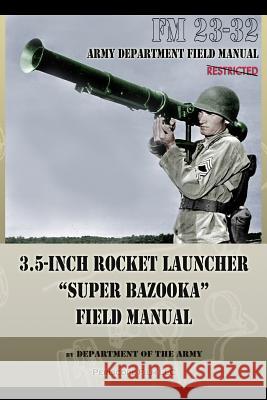3.5-Inch Rocket Launcher Super Bazooka Field Manual: FM 23-32 » książka
3.5-Inch Rocket Launcher Super Bazooka Field Manual: FM 23-32
ISBN-13: 9781940453026 / Angielski / Miękka / 2013 / 88 str.
The 3.5-inch rocket launcher, also known as the super bazooka, was introduced in early 1950 and saw considerable action throughout the Korean War. The success of the powerful German Panzerschreck 88mm anti-tank rocket caused the United States to completely rethink the bazooka at the close of World War II. Based on the Panzerschreck's design, the M20 was significantly larger than the 2.36-inch bazooka of WWII.Though bearing a superficial resemblance to the Nazi weapon, the M20 had greater effective range, power and accuracy. The M20 was a two-piece, smooth-bore weapon weighing only twelve pounds with an assembled length of sixty inches. It fired a "shaped charge" that concentrated the force of the explosion on a very small area, thus allowing the projectile to penetrate armor plate as thick as eleven inches. It boasted a range of up to 900 yards. In addition to the M20 model, the Army produced further developments designated M20A1/A1B1 and M20B1. Similar to the M20, they boasted various simplified components including latch assemblies, and in the case of the M20B1 aluminum barrels. Created in 1961, this field manual reveals a great deal about the 3.5-inch rocket launcher M20A1 and M20A1B1's design and capabilities. Intended as a manual for those charged with operation and maintenance, it details many aspects of its controls, ammunition and sighting equipment. Originally labeled restricted, this manual was declassified long ago and is here reprinted in book form. Care has been taken to preserve the integrity of the text."











